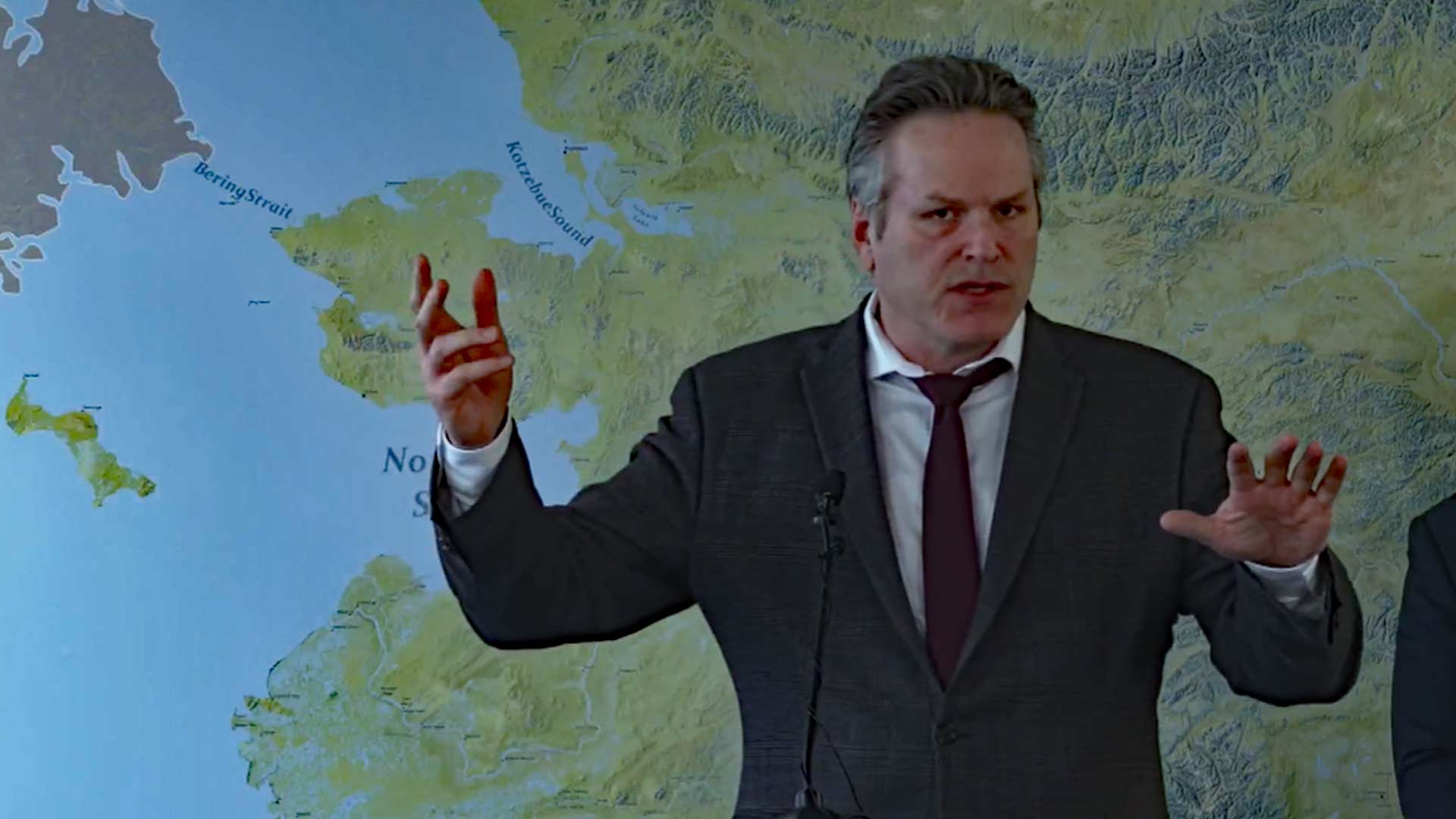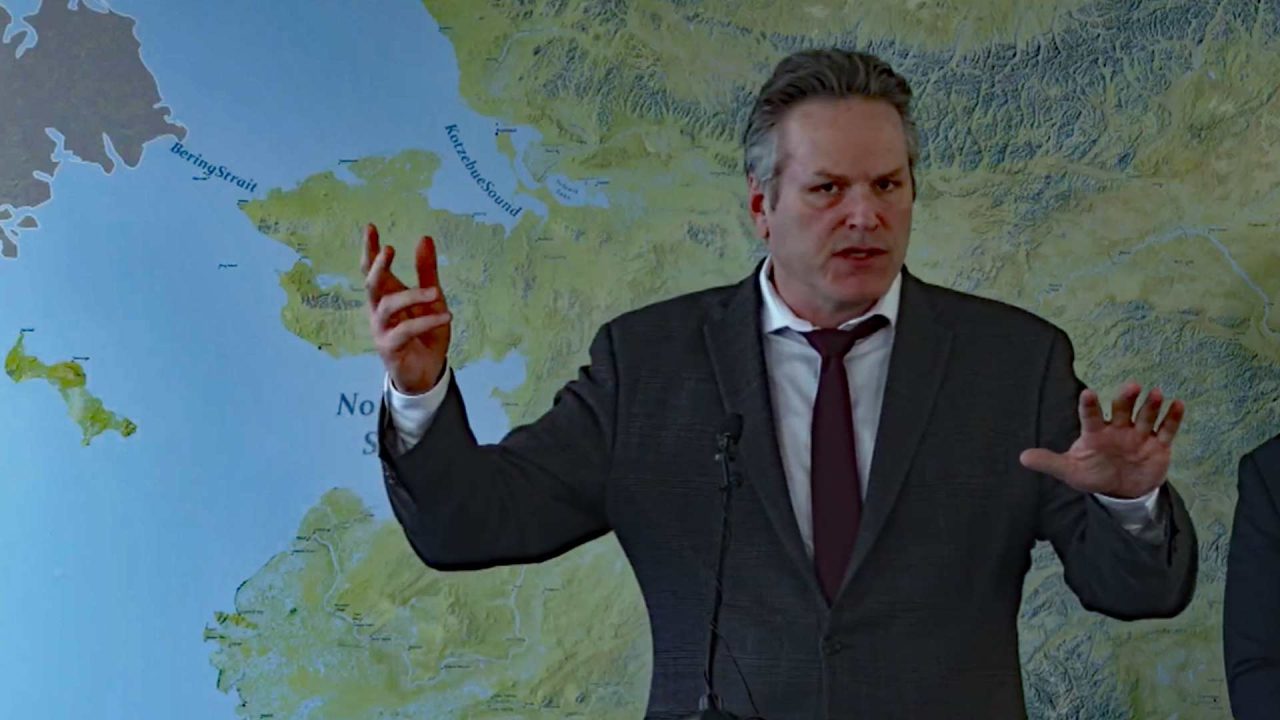
Gov. Mike Dunleavy is prepared to fight for the ability of Alaskan parents to access a publicly-funded homeschool education for their children, including the ability to purchase courses and instruction from private and religious institutions and organizations.
In a fiery April 17 press conference, the governor laid out several options that his administration is prepared to pursue if the Alaska Supreme Court upholds a recent lower court decision which has effectively ruled that the state’s current homeschool, and correspondence programs are unconstitutional.
The April 12 decision by Superior Court Judge Adolf Zeman has sent shockwaves through Alaska’s homeschool and private educational communities at a time when home education and private enrollment are soaring.
According to Zeman’s opinion, Alaska’s practice of reimbursing parents for expenses accrued for lessons, classes and instruction at private and religious institutions is a violation of the Alaska Constitution, which states, “No money shall be paid from public funds for the direct benefit of any religious or other private educational institution.”
Attorney General Treg Taylor noted that the decision is both deeply flawed and far reaching, as it also suggests that it would be unlawful for school districts to partner with any private “organization.”
“If we find ourselves in a bind, and of the statutes are thrown out and you have 24,000 kids in limbo we are going to come up with as many possibilities as we can to assist them with education, at least through the coming year, and one of those options is an educational dividend,” Dunleavy explained.
He said that by adding “private organizations” to the prohibited benefactors of public funds, Judge Zeman has implicated a whole host of vendors and private contractors that have worked with public schools for decades. This would include companies that provide art classes, music instruction, food services, textbook companies and many other goods and services.
“It is extremely broad in what it encompasses and the legal arguments that were used in this decision, they now could be used against any spending a school district does outside the public entity,” Taylor maintained.
Taylor said the state is hoping for a quick decision by the Alaska Supreme Court, and they have not ruled out an appeal to the U.S. Supreme Court, if necessary.
Gov. Dunleavy blasted the National Education Association teachers’ union for filing the case in the first place, saying it was likely motivated by a desire to stem the tide of tens of thousands of children who are leaving traditional neighborhoods public schools for other options, like homeschooling and private educational offerings.
“Part of the reason it’s happening now is that we have gone from a few thousand kids in homeschool programs to 24,000 and growing,” he said. “In the end is it the State of Alaska – the people of Alaska – are they going to determine what our educational system looks like? Or is it going to be NEA or the school boards’ association? So really this is a fight about control. There’s no doubt about it. It will be masked as a religious direct benefit question, but in the end it’s really about who is going to control the educational programs for the state of Alaska and its kids.”
Dunleavy said he is waiting to see how the Supreme Court will rule, but if it upholds the current opinion, he is prepared to push for a constitutional amendment, or to issue educational dividends for the coming school year so parents can continue securing homeschooling and private educational offerings for their kids.
He also floated the idea of dispersing what he called “K-14 scholarships,” which parents could use to help pay for a wide range of educational options, including those offered at private or religious schools.
Just as the state does not ask residents whether they use their Permanent Fund Dividends to pay for religious goods or services, he said an educational dividend would not inquire about the expenditures either.
“Unless it’s just a discussion on money, there is really no desire by some, including those that filed suit on this homeschool program to really care about how kids are educated,” he said. “It’s really about money.”
“If we find ourselves in a bind, and of the statutes are thrown out and you have 24,000 kids in limbo we are going to come up with as many possibilities as we can to assist them with education, at least through the coming year, and one of those options is an educational dividend,” Dunleavy explained.
He then dismissed the notion that 24,000 correspondence students would somehow magically reappear in brick-and mortar government schools.
“That’s not going to happen,” he said, noting that families have left these traditional schools for myriad reasons.
Dunleavy also challenged the notion that public education has to be a closed loop where all money comes from and goes to government-provided goods and services. That is simply not possible, he said, citing the countless private contractors, vendors and businesses that partner with government in facilitating public education.
He also addressed the misnomer that parents who use their public allotments to secure educational opportunities for their kids are somehow no longer engaged in a public education.
ALASKA WATCHMAN DIRECT TO YOUR INBOX
Dunleavy explained that parents have long worked with public homeschool programs to purchase approved classes that may not be available in a traditional public-school setting. He listed Latin classes, wielding programs and others as examples.
He said there is no such thing as a simple public only education. It relies on private contractors, vendors and businesses.
Towards the end of the press conference, Dunleavy surmised what the real purpose of the lawsuit against correspondence programs was really all about.
“The real purpose of this case is control,” he said. “There is a worry that neighborhood schools are going to lose market share.”
He then blasted the plaintiffs in the case for only caring about money, rather than providing quality educational options for Alaska students.
“Unless it’s just a discussion on money, there is really no desire by some, including those that filed suit on this homeschool program to really care about how kids are educated,” he said. “It’s really about money.”








19 Comments
Actually, this is a very good ruling as it also excludes all 501c3 non profit programs which have been milking the system for years. the savings to the state would be massive which would allow for a full traditional PFD which would more than pay for the cost of homeschooling. The public school program has been skimming off $3,000 in administrative costs for home school students. This practice would stop as well. these non profit boards which have been paying board members massive money would immediately dry up. Last year non profits skimmed off over $200 million just for homeless programs and meanwhile the homeless population has grown! the gravy train is drying up! Good riddance!!
What is K-14?! Now there’s two extra grades?
This encompasses special education students as they are protected with a couple of extra years to achieve diploma status.
I wonder if the 13-14 are the two years that people take to get basic courses out of the way when they start college before they move into their degree program? I am thinking that this would cover the college classes that kids take while in high school that will count towards meeting their college requirements. I know there are quite a few kids – in public schools and homeschooled that take college classes before they have graduated from high school.
What, in justice, does the state properly owe to its citizens? Does the state have an obligation to provide education to its citizenry? If so, how do we discern the parameters within which it is provided/how far does it extend/how much does a family reasonably need to educate their children? Is the state responsible for providing private music lessons, dance lessons, sports programs, ski classes, summer camps, horse camps, etc. ?
Honest questions, all.
I am glad to see the AG and the Governor trying to work out some viable options. I am acquainted with a family that does homeschool. They were shocked when they found out what the judge had ruled and were happy to see Dunleavy trying to save the homeschool programs.
I had a friend that put her five children through homeschooling and then proceeded to find them all college scholarships to get them through college. If the NEA has its way there will be no option to public schools anywhere in the United States. This is just the opening salvo. Parents have a right to choose where their kids go to school, and should not be forced to pay the money for public schools if they are sending their children elsewhere. In Alaska there are many children who have no access to public schools. The NEA and Scott Kendall have turned their backs on these kids and a correspondence program that had been in force since 1898. How typical of Kendall and crew.
Just out of curiosity, what did your friend’s five childran get their college degrees in?
It’s called a society. We compromise.
Mike Dunleavy Biography: Unveiling The Life And Biography Of Mike Dunleavy (Prestigious Leaders of world Systems) https://a.co/d/ejotoJu
I eagerly await the accompanying coloring book to share with my homeschool foster children for our discussion of the Great Man theory of history.
Interestingly enough, most families who are well seasoned homeschool families do not get or even attempt to get faith based curriculum covered by their allotment- because it’s never been allowed. This isn’t new. We pay out of pocket for all of our faith based curriculum. I’m trying to figure out why a Supreme Court judge thinks otherwise?
On a separate note: indoctrination, crt, gender fluidity, all these other “subjects” that are being taught in public schools should be subjected to the same scrutiny and standards as any curricula that homeschoolers are required to uphold.
If I were the Governor, I would immediately shutdown every penny being paid out to EVERY private and religious organization that provides or provides access to educational materials until this is remedied in court. Including online curriculum used in schools, unions (these are private organizations), conferences and seminars for teacher education, internet services, textbooks, aptitude test (conducted online), computer purchases, etc. Anything paid to a private company for education purposes and instruct the department of education to begin writing their own textbooks and aptitude tests on the basics, reading, writing, and arithmetic and duplicating them by hand or ask someone to donate copiers because you can’t buy them from or send them out to be printed at a private company. If he does this, these unions will literally be back in court fighting to get their own perceived win overturned. State could sit back and not spend a dime in legal fees. Maybe give it to schools instead of lawyers.
Referring to what “V” stated, the other indoctrinating subjects curriculum being taught is generally provided free of charge from corporations and NGO’s like planned parenthood pushing their agendas. This can be countered simply by faith based organizations providing quality curriculum at no charge to the parents online. If a faith based organization really cares about what kids learn and need, they’ll use some of the 10% tithing money or ask for donations and make it free to all who want it.
Makes you wonder how the test scores of the public school students vs the private/home school students would stack up against each other? Who is getting the best education? I went to a private school and a public school in high school. In private school I learned to respect teachers and the value of a strong work ethic. In public school I learned about planned parenthood and how to smoke pot during wood shop. Makes me wonder if public educations purpose is to make the student graduate with minimal education and low self-worth to where they choose to live off the government until grave.
There’s no wondering. Look at the test scores, grades and graduation rates of both. Homeschool for the win.
Hey you readers of this vey well done blog, thanks to Joel.
Your governor has a very clear reputation now that no one hear or anywhere else in this state can deny it! Spineless, gutless, tall = small, tepid, weak, etc. Placing hope in this hopeless baffoon is stupid beyond belief! You may think he’s a nice guy or a good man, again I remind you that for evil to flourish watch as your “good “men stand by and do nothing!
Sincere question about this ruling: does this mean public funds towards ANY private company are unconstitutional? What about the public school that purchases reading books from a private company? Or the public school that contracts with a private company to use their software? Would those scenarios become illegal under this ruling?
I think that’s the point Attorney General is making here:
“It is extremely broad in what it encompasses and the legal arguments that were used in this decision, they now could be used against any spending a school district does outside the public entity,” Taylor maintained
In light of this ruling, I certainly hope Dunleavy has dropped any notion of rewarding AK public schools with any increase in funding.
Im grateful we have such a smart judge to uphold our Alaskan Constitution. Too many families have been stealing public dollars for their kids private education. Its plainly illegal.
In light of this ruling, I certainly hope the Juneau Legislature has dropped any notion of rewarding AK public schools with any increase in funding. Instead they use the funds to fund a full permanent fund dividend based on the five year rolling average of earnings from the Permanent Fund split 50:50 between government/residents and not 75%/25%.
Proposing a $1,300 Permanent Fund dividend and a paltry $175 in an energy relief check is a slap in the face of all Alaska residents.